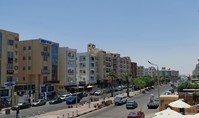Legal information about buying properties in Egypt
Do I need legal advice/accompaniment and can you help with this?
As everywhere in the world, legal advice is strongly advised in Egypt. At your request, our corporate attorney can provide you with professional advice for a small fee. He checks all documents before your purchase, accompanies you during the purchase process and can also carry out the purchase contract registration for you if desired.
Are the properties offered by Regal Estate Hurghada already checked or do I still have to commission a check myself?
Every project we offer ( large project or small property ) is thoroughly checked by our legal department before being included in our program. For every large property we already have “Due Diligence” papers ( building permits and licenses ).
Is the purchased property really 100% my property and possession?
Yes, the properties we offer are “Freehold” properties. This means that the property is 100% yours and when you buy a villa or house you also own it together with a piece of land. Some parts of Hurghada ( El Gouna, Moubarak 1-11) and also outside (e.g. Marsa Alam) are subject to leasehold law. This is often mistakenly referred to as leasehold, which is not true. With “Leasehold” properties you buy the lease in Egypt for a certain period of time, mostly 49-99 years, with the option to extend based on the initial lease price.
In which language is the contract drawn up?
The sales contracts are drawn up in Arabic-English or in Arabic-German, as the Arabic language is legally valid. Please ask for other languages in individual cases.
How do I get a resident visa as a foreigner?
The visa office is located in Hurghada, in the El Helal district. You will need your passport and 2 passport photos. We recommend that you have the required copies made at the Visa Office, because the rules regarding how many copies are required change very often. The staff at the visa office will give you an A4 form in English to fill out. Only a few personal data have to be filled in, this form you hand in together with the copies and photos. A few days later you can pick up your resident visa. For the departure and re-entry during the duration of the visa you may need a re-entry, otherwise your visa will expire upon departure!
Does a resident visa have advantages?
Yes, because you get considerable discounts in (public) hospitals and at doctors. As a rule, you can assume the same prices as for locals. You can also use this visa to sign contracts with telephone companies and also to buy health insurance.
What do I need to open a bank account?
The opening of a bank account is connected with the “Resident Visa”. So before opening the bank account you need the resident visa. Likewise, you will need a rental contract (stamped by the public Notar office) or your sales contract. To open an account in Egyptian pounds you need to deposit min. 5000 EGP. In addition, you will need your passport (with at least 6 months resident visa) and proof of income (bank statement from your bank in Europe or proof of pension or salary). Without any problems you can also open an account in these currencies ( Euro, GBP, Dollar ).
General further information
What tips should buyers of real estate in Egypt consider?
Whether it’s a modern city property in vibrant Hurghada or a luxurious villa right by the sea in Egypt, many people dream of owning a house or flat far away from home. But whether at home or abroad, buying a property is always a big step that can present the prospective buyer with many challenges. Below you will find 5 helpful tips for your real estate purchase in Egypt. If you pay attention to all the important factors, you will enjoy buying a property abroad for a long time – regardless of whether it is your first or second home.
Tip 1: Well prepared for your dream property
Owning a house or flat in Egypt brings with it a number of advantages. Owners can spend their holiday time and days off in Egypt while saving on hotel fees. Property owners can also rent out their property to generate additional income. Especially in popular areas, high returns often beckon. With increasing age, the property abroad can also serve as a retirement home, for example to escape the cold winter months. But in addition to many advantages, there are also risks.
Tip 2: Do not make rash decisions
Prospective buyers should not make hasty decisions and should check the property in terms of location and accessibility. What looks like the dream property in pictures may turn out to be a dilapidated ruin in real life.
Tip 3: Keep an eye on extra costs
Prospective buyers who decide to purchase a property in Egypt should bear in mind that there are additional costs besides the general purchase costs. These are, for example, costs for the lawyer, interpreter, notary fees, etc. Prospective buyers should definitely make use of an inspection (travel costs) in order not to fall victim to fraudsters. Those who have problems with the local language should hire an interpreter and lawyer to translate documents and help with legal steps. In this case, prospective buyers should find out what prices they should expect for the services of an interpreter and lawyer.
Tip 4: Find a suitable property
Good, better, best: Clients should not immediately opt for the first property that comes along. You can do this by researching on the internet and using registered, professional real estate agents.
Tip 5: Beware of pitfalls
Other countries, other customs: What would seem unprofessional in your home country may well be binding in other countries. In your home country, a written agreement may not count as a complete purchase contract. Abroad, things may be different. Anyone staying abroad should be careful not to sign anything unknown. A piece of paper can quickly become your undoing if no lawyer is present. Future property owners should also not allow themselves to be pressured into signing a contract. If you are unsure, stay away from preliminary contracts and verbal promises. These are binding in many countries.
As a matter of principle, this should be remembered in other countries during business discussions and when concluding contracts:
– Verbal agreements should also be written in the sales contract. Then they cannot be disputed later.
– Do not sign anything hastily and do not succumb to the misconception that a privately signed preliminary contract, an option to purchase or an unprofessionally drafted purchase contract is not legally binding. Quite the opposite: payment obligations may very well arise from them.
– If you do not have sufficient language skills, a licensed and competent lawyer should be present at the
purchase contract meeting.

